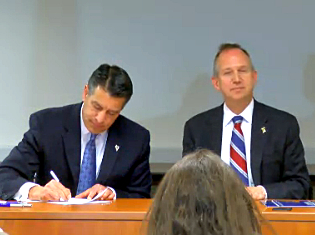 Nevada and Delaware have announced the signing of the United States’ first interstate compact for sharing online poker liquidity. The governors of Nevada and Delaware – Brian Sandoval and Jack Markell, respectively – made the announcement at a joint press conference in Wilmington, Delaware on Tuesday morning. The Multi-State Internet Gaming Agreement (read it here) is the culmination of months of negotiations between the states and establishes the framework for future cooperation between other states as they open up their own online poker markets. It also marks the first official fruit of the US Department of Justice’s late-2011 clarification that the 1961 Wire Act barring interstate gambling applied strictly to sports betting.
Nevada and Delaware have announced the signing of the United States’ first interstate compact for sharing online poker liquidity. The governors of Nevada and Delaware – Brian Sandoval and Jack Markell, respectively – made the announcement at a joint press conference in Wilmington, Delaware on Tuesday morning. The Multi-State Internet Gaming Agreement (read it here) is the culmination of months of negotiations between the states and establishes the framework for future cooperation between other states as they open up their own online poker markets. It also marks the first official fruit of the US Department of Justice’s late-2011 clarification that the 1961 Wire Act barring interstate gambling applied strictly to sports betting.
There is no official date for when the liquidity sharing will commence. The technical nuts and bolts have yet to be finalized between the two states’ regulatory bodies and their licensed operators, but players in each state will remain subject to the laws of the state in which they reside and the state governments will continue to apply rake and taxes to the players within their respective borders. While Delaware’s online players have the option of playing casino games, these options won’t be accessible to players in Nevada’s poker-only system.
The deal also calls for the formation of the Multi-State Internet Gaming Association (MSIGA), a Delaware LLC whose mandate is to hammer out minimum standards for future state participation in online poker liquidity sharing. Sandoval said he had spoken with representatives of New Jersey – the only other state to have legalized online gambling to date and by far the biggest of the three markets in play – about joining the new partnership but offered no specifics as to what response he got.
New Jersey has offered no indication that it intends to join Nevada and Delaware in the liquidity pool. Indeed, New Jersey would appear to have little incentive to share its toys with the have-not states, especially as it has its own ambitions of becoming online poker’s nationwide regulatory hub. There are no other states that appear dead certain to pass online gambling legislation in 2014 except possibly California, where the most promising online poker bill would expressly prohibit any state from dipping its toes into the Golden State’s deep liquidity pool.
Given the size of the Nevada and Delaware poker markets, the signing of Tuesday’s agreement is for the moment largely symbolic, as neither state really has much to share with the other. Nevada has promised to finally divulge its official online poker revenue figures now that the state’s third online poker site (RealGaming.com) is ready to launch, but analysts have suggested the state’s two licensed sites earned a combined $200k in December 2013. Things are even grimmer in Delaware, where online gambling revenue figures for January were up a mere 3.7% from December to $145k, although the poker vertical’s share of that total fell 17% to $88k. New Jersey’s January figures showed poker claiming 41% of the state’s total $9.5m revenue take.
